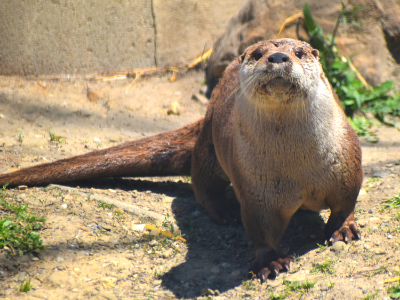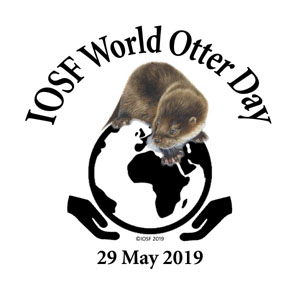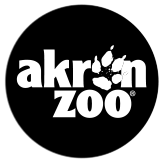know a species that’s otter this world, and that species is the otter! Unfortunately, this statement is truer than many of us realize. Otters are incredibly playful animals who we love to learn about and visit at our local zoos, but many are threatened or even endangered and, without action, we may someday (sadly) live in a world without them. That is why on May 27 we celebrate World Otter Day, a holiday created to raise awareness to the plight of our furry friends.
 There are 13 species of otters in the world today: Eurasian otters, African clawless otters, Asian small-clawed otters, sea otters, marine otters, neotropical otters, spotted necked otters, giant otters, Southern river otters, smooth coated otters, hairy nosed otters, Congo clawless otters and, our personal favorite, North American river otters. Of these 13, the only species to have a stable population in their natural habitat is the North American river otter. Threats to otters including pollution, habitat loss, trapping and illegal trade are just a few of the many factors that have pushed many of these species closer to extinction.
There are 13 species of otters in the world today: Eurasian otters, African clawless otters, Asian small-clawed otters, sea otters, marine otters, neotropical otters, spotted necked otters, giant otters, Southern river otters, smooth coated otters, hairy nosed otters, Congo clawless otters and, our personal favorite, North American river otters. Of these 13, the only species to have a stable population in their natural habitat is the North American river otter. Threats to otters including pollution, habitat loss, trapping and illegal trade are just a few of the many factors that have pushed many of these species closer to extinction.
Fortunately, there are ways you can combat otter annihilation, even while you are at home! The first is to learn about your local otter species. Otters live on every continent except for Australia and Antarctica, and all ecosystems thrive on balance, even those in our own backyard. Being informed about local otter species can help us to take daily steps to maintain a safe and welcoming environment for them.
The Akron Zoo, for example, loves to introduce guests to our North American river otter, Molly. North American river otters are local to Ohio and have one of the greatest success stories in otter conservation. In the 1800’s, the North American river otter population was shrinking because of hunting and pollution, and the species eventually disappeared completely from our area. However, in 1986, the Ohio Division of Wildlife began a project to reintroduce North American river otters to Ohio, and in 2002, Ohio’s otter population was thriving and was removed from the Ohio endangered species list. River otters are now listed as least concern on the IUCN red list and can be found in 75 watersheds throughout Ohio. Thanks to increased otter awareness, local habitats are healthier and safer for these otters than they have been in decades! However, it is important to carry on this success story in order to see continued population growth and healthy ecosystems.
 Another way to contribute to otter conservation is through organizations such as the International Otter Survival Fund (IOSF). The IOSF is one of the world's leading otter charities, dedicated to the conservation, protection and care of otters based on scientific research. Otters make their homes in many different environments and require both unpolluted aquatic and terrestrial habitats to survive. The IOSF makes it their duty to protect these important wetland ecosystems, benefiting otters, other wetland species, and ultimately us!
Another way to contribute to otter conservation is through organizations such as the International Otter Survival Fund (IOSF). The IOSF is one of the world's leading otter charities, dedicated to the conservation, protection and care of otters based on scientific research. Otters make their homes in many different environments and require both unpolluted aquatic and terrestrial habitats to survive. The IOSF makes it their duty to protect these important wetland ecosystems, benefiting otters, other wetland species, and ultimately us!
"Otters are incredibly important to the environment, and their conservation is not just sentimental luxury,'' says Ben Yoxon, Research and Education Officer at the IOSF. "Their conservation is integral to the conservation of wetland habitats. We are passionate about otters and protecting their populations across the world through a number of different projects."
You can help the IOSF in their mission by giving online, or by joining the IOSF’s World Otter Day Raffle for the chance to win some otterly spectacular prizes while helping to fund otter conservation!
Our local habitats “otter” be safe for all animals! If you would like to learn more about otters in Ohio and around the world, be sure to attend our Otterly Amazing Webinar this Saturday, May 30. During this World Otter Day Celebration, you will enjoy a live presentation from the IOSF, an otter training, keeper talks and a presentation on otter conservation with representatives from Summit Metro Parks. There will also be opportunities for Q&As after every presentation, so come prepared with all your otter questions! Molly can't wait to see you, so wh’otter you waiting for? We hope to see you there!
